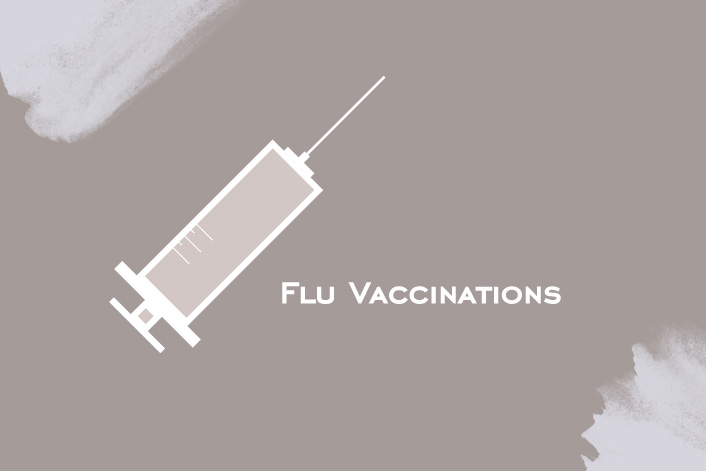Winter is likely to look a little different this year and as we approach the winter months, it is important – now, more than ever – to consider the ways in which we can protect ourselves from sickness.
Flu season is nearly upon us and influenza infection poses additional risks this year in lowering our immune function (which is particularly dangerous for the elderly and for people with existing chronic illness), potentially overloading our health system (whilst our doctors, nurses and health professionals fight the increasing spread of COVID-19) and hinder efforts to slow the spread of COVID-19 (which presents with very similar symptoms to influenza) within our community.
The flu vaccine remains our best defence against the common strains of influenza and it is recommended for people of all ages in our community.
So what is influenza?
Influenza is a highly contagious disease that can cause a wide spectrum of disease, from no or minimal symptoms, to respiratory illness with systemic features, to multisystem complications and death.
In adults, the onset of illness due to influenza is often abrupt, usually after an incubation period of one to three days.
Common symptoms include
- Cough
- Nasal discharge
- Sneezing
- Malaise
- Fever (which peaks at the height of illness)
- Chills
- Headache
Influenza is transmitted from person to person by virus-containing respiratory droplets produced during coughing or sneezing, or by direct contact with respiratory secretions.
Contaminated droplets can survive for up to eight hours on some surfaces.
Who is at risk?
There are certain groups within our community who currently at higher risk of contracting and experiencing severe disease from both influenza and COVID-19.
Risk of complications is increased with:
- Advanced age
- Infancy
- Lack of previous exposure
- Greater severity of the viral strain
- Chronic conditions, such as heart or lung disease, renal failure, diabetes, and chronic neurological conditions
- Immunocompromised people
- Obesity (class III)
- Pregnancy
- Smoking
What does this all mean for us now, in the midst of the COVID-19 health crisis?
Influenza poses a serious risk to parts of our community every year however in the midst of the COVID-19 health crisis, it poses some additional complications.
Widespread transmission of the influenza virus could significantly hamper efforts to slow the spread of COVID-19 in the following ways:
- High-risk groups are at risk of contracting the influenza virus with severe symptoms which may lead to hospitalisation, placing additional strain on our health system
- Influenza may also lower immune function potentially leading to more severe illness from COVID-19 if it is contracted later.
- Otherwise healthy community members are at risk of contracting the influenza virus and transmitting the influenza virus to high-risk groups
- Given the similarities in symptoms between influenza and COVID-19, widespread cases of influenza may lead to confusion within the community about whether people have COVID-19 or influenza, leading to increased pressure on pharmacies, GPs, and hospitals to assess people’s symptoms and manage the treatment of symptoms
So what can we do!?
Vaccinate!
As we have seen with the current COVID-19 health crisis, it is important that we not only look after our own defences against illness but also protect those at high risk of severe complications within our community.
The influenza vaccine can help us as the single most important measure to prevent and reduce influenza infection. After vaccination, most adults develop antibody levels that are likely to protect them against the strains of virus represented in the vaccine. In addition, there is likely to be protection against many related influenza variants.
By choosing to vaccinate, we protect ourselves, prevent transmission to high-risk groups and potentially decrease the risk of hospitalisation. This will, in turn, ensure our hospitals are in the best place possible to treat patients experiencing severe illness from COVID-19 as the situation evolves.
Vim & Co In-store Vaccinations:
The National Immunisation Program (NIP) offers funded influenza vaccination to at-risk individuals. Doctors are able to provide these vaccines to eligible groups at no cost. It is important to note that, while these groups may be able to receive the vaccine at no costs, Doctors may still charge a consult fee to administer the vaccine.
Groups eligible for no-cost vaccines include:
- Adults over 65 years of age
- Aboriginal and Torres Strait Islander people aged 6 months and over
- Pregnant women
- People six months and older with a medical condition that places them at high risk of complications with influenza
- Transplant recipients (note: dosing schedule varies)
In a pharmacy setting at Vim & Co, we are currently able to vaccinate from 10 years of age.
Vaccinations will cost $19.95 which includes the vaccine and administering of the vaccine in-store and the fee is payable when you attend the store for your vaccination.
How do I book my vaccination at Vim & Co?
Visit our In-Store Vaccination page here to read about the best way to book your flu vaccination this year.



